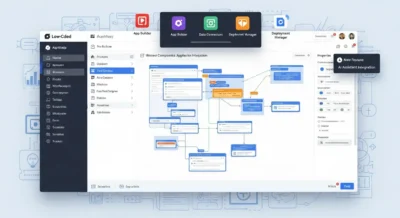In today’s data-driven business landscape, organizations rely on effective business intelligence (BI) solutions to extract valuable insights from their vast datasets. Cloud business intelligence has emerged as a transformative approach, combining the power of cloud computing with advanced analytics capabilities. By leveraging the scalability, flexibility, and accessibility of the cloud, organizations can unlock the full potential of their data and make informed decisions with speed and agility. This article explores the concept of cloud business intelligence, its benefits, and its impact on data-driven decision-making.
Understanding Cloud Business Intelligence
Cloud business intelligence refers to deploying business intelligence tools and platforms on cloud infrastructure. These cloud-based solutions enable organizations to process, analyze, and visualize large datasets without extensive on-premises infrastructure and hardware. By leveraging cloud computing technologies, such as Software-as-a-Service (SaaS) and Platform-as-a-Service (PaaS), organizations can access sophisticated analytics capabilities, collaborate in real time, and scale their BI operations to meet evolving data requirements.
Scalability and Flexibility
Cloud business intelligence offers unparalleled scalability and flexibility. Organizations can scale their BI resources up or down based on data volumes, user demands, and evolving business needs. Cloud infrastructure allows for elastic provisioning, enabling organizations to handle sudden spikes in data processing requirements without investing in additional hardware. This scalability ensures that BI systems can keep pace with the organization’s growth and support data-intensive analytics tasks effectively.
Cost Efficiency
Cloud business intelligence eliminates the need for upfront hardware investments and infrastructure maintenance costs. Organizations can leverage the pay-as-you-go model, where they only pay for the resources they consume. The cloud provider handles infrastructure maintenance, software updates, and security, reducing the burden on internal IT teams. Additionally, cloud-based BI eliminates the costs associated with hardware upgrades, data center maintenance, and software licensing fees, making it a cost-effective solution for organizations of all sizes.
Rapid Deployment and Time-to-Value
Cloud business intelligence solutions offer rapid deployment, allowing organizations to get up and running quickly. The cloud-based infrastructure eliminates the need for complex setup and configuration processes. Organizations can leverage pre-built connectors to integrate their data sources seamlessly, enabling faster data ingestion and analytics. This accelerated deployment timeline translates into shorter time-to-value, allowing organizations to derive insights and swiftly make data-driven decisions.
Real-Time Collaboration
Cloud business intelligence promotes real-time collaboration and data sharing among teams. With cloud-based BI platforms, multiple users can access and work on the same data simultaneously, regardless of geographical location. Real-time collaboration features enable teams to share insights, annotations, and visualizations, fostering a data-driven decision-making culture and ensuring stakeholders work with the most up-to-date information. Collaborative features enhance transparency, alignment, and efficiency across the organization.
Advanced Analytics Capabilities
Cloud business intelligence solutions offer advanced analytics capabilities beyond traditional reporting and basic data visualization. These solutions often incorporate machine learning algorithms, predictive analytics, and natural language processing capabilities. Organizations can leverage these tools to discover hidden patterns, forecast future trends, perform predictive modeling, and gain deeper insights from their data. The cloud infrastructure provides the computational power to handle complex analytics tasks, enabling organizations to make more accurate and informed decisions.
Accessibility and Mobility
Cloud business intelligence provides accessibility and mobility, allowing users to access insights and dashboards anywhere and on any device. With cloud-based BI solutions, stakeholders can access and interact with data visualizations and reports using web browsers or mobile applications. This accessibility ensures decision-makers have the information they need at their fingertips, even on the go. It facilitates remote work, supports distributed teams, and enables data-driven decision-making regardless of the physical location.
Conclusion
Cloud business intelligence has revolutionized how organizations leverage data to gain insights and make informed decisions. By harnessing the power of cloud computing, organizations can access scalable, cost-effective, and collaborative BI solutions. Cloud-based BI enables rapid deployment, real-time collaboration, advanced analytics capabilities, and accessibility across devices, empowering organizations to derive actionable insights from their data with speed and agility. As organizations strive to become more data-driven and competitive, embracing cloud business intelligence is essential for leveraging data as a strategic asset and driving business success in the digital age.













